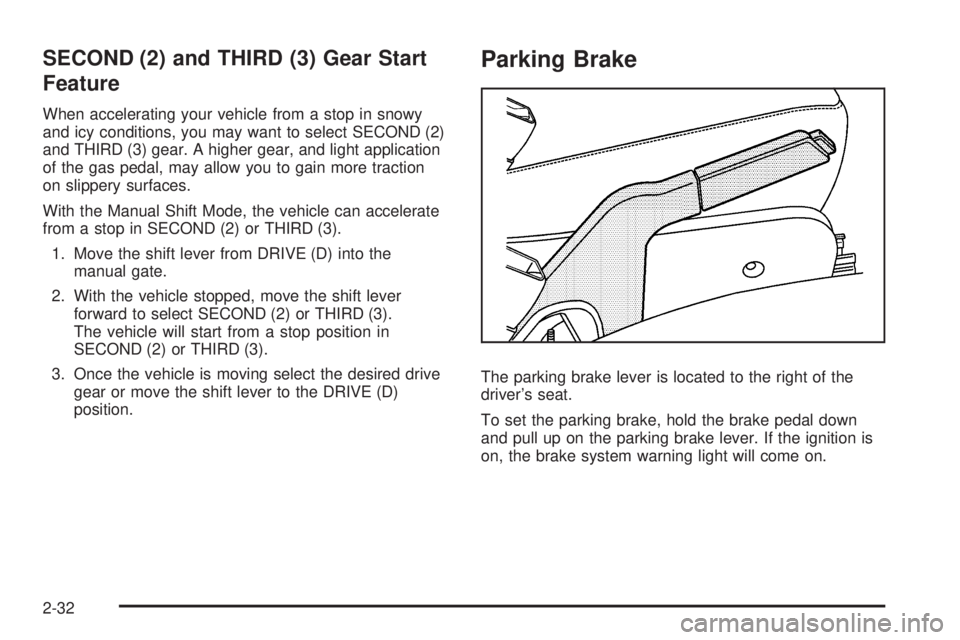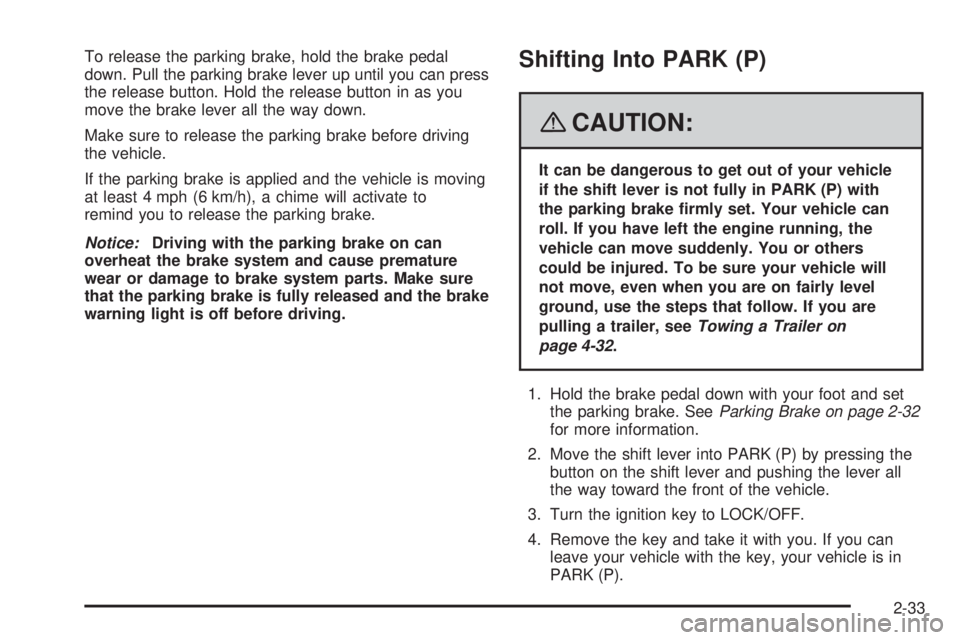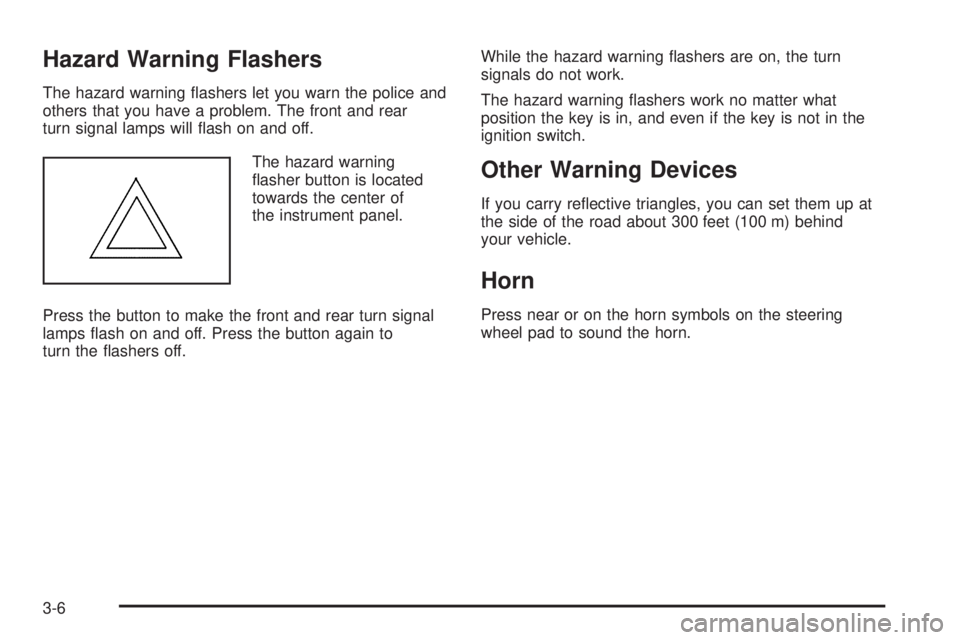2008 PONTIAC TORRENT warning
[x] Cancel search: warningPage 107 of 434

2. Push the shift lever forward toward the plus (+) to
upshift or rearward toward the minus (−)to
downshift.
When using the Manual Shift Mode (MSM) the
number of the gear selected will appear on
the instrument cluster below the shift position
display.
In manual shift mode all six forward gears can be
selected.
While using the MSM feature the vehicle will have
operation similar to a manual transmission. You can use
this for sport driving or when driving hilly roads to
stay in gear longer or to downshift for more power or
engine braking.
The transmission will only allow you to shift into gears
appropriate for the vehicle speed:
The transmission will not automatically shift to the
next higher gear without moving the shift lever.
The transmission will not allow shifting to the next
lower gear if the vehicle speed is too high.
If the vehicle does not respond to a gear change, or
detects a problem with the transmission, the range
of gears may be reduced and the Malfunction Indicator
Lamp will come on. SeeMalfunction Indicator Lamp
on page 3-36.
Transmission Overheating
If the transmission �uid temperature rises above
270°F (132°C) or rises rapidly, the Engine Coolant
Temperature Warning Light will �ash. SeeEngine
Coolant Temperature Warning Light on page 3-35for
more information. When the transmission overheats
it will go into a protection mode and will default into a
different shift sequence to help cool the transmission
�uid. This shift sequence is the same for both DRIVE (D)
position and manual mode. Continue driving the
vehicle in either position depending on the required
vehicle speed and load. Once the �uid temperature
lowers to the normal temperature range, the
transmission will return to the normal shift patterns.
Towing or driving on long hills can cause the
transmission �uid temperature to be higher than normal.
If the transmission �uid temperature will not cool, you
may need to pull over and check the transmission
�uid level. You should also check the engine coolant
temperature. If it is hot, seeEngine Overheating
on page 5-25.
2-31
Page 108 of 434

SECOND (2) and THIRD (3) Gear Start
Feature
When accelerating your vehicle from a stop in snowy
and icy conditions, you may want to select SECOND (2)
and THIRD (3) gear. A higher gear, and light application
of the gas pedal, may allow you to gain more traction
on slippery surfaces.
With the Manual Shift Mode, the vehicle can accelerate
from a stop in SECOND (2) or THIRD (3).
1. Move the shift lever from DRIVE (D) into the
manual gate.
2. With the vehicle stopped, move the shift lever
forward to select SECOND (2) or THIRD (3).
The vehicle will start from a stop position in
SECOND (2) or THIRD (3).
3. Once the vehicle is moving select the desired drive
gear or move the shift lever to the DRIVE (D)
position.
Parking Brake
The parking brake lever is located to the right of the
driver’s seat.
To set the parking brake, hold the brake pedal down
and pull up on the parking brake lever. If the ignition is
on, the brake system warning light will come on.
2-32
Page 109 of 434

To release the parking brake, hold the brake pedal
down. Pull the parking brake lever up until you can press
the release button. Hold the release button in as you
move the brake lever all the way down.
Make sure to release the parking brake before driving
the vehicle.
If the parking brake is applied and the vehicle is moving
at least 4 mph (6 km/h), a chime will activate to
remind you to release the parking brake.
Notice:Driving with the parking brake on can
overheat the brake system and cause premature
wear or damage to brake system parts. Make sure
that the parking brake is fully released and the brake
warning light is off before driving.Shifting Into PARK (P)
{CAUTION:
It can be dangerous to get out of your vehicle
if the shift lever is not fully in PARK (P) with
the parking brake �rmly set. Your vehicle can
roll. If you have left the engine running, the
vehicle can move suddenly. You or others
could be injured. To be sure your vehicle will
not move, even when you are on fairly level
ground, use the steps that follow. If you are
pulling a trailer, seeTowing a Trailer on
page 4-32.
1. Hold the brake pedal down with your foot and set
the parking brake. SeeParking Brake on page 2-32
for more information.
2. Move the shift lever into PARK (P) by pressing the
button on the shift lever and pushing the lever all
the way toward the front of the vehicle.
3. Turn the ignition key to LOCK/OFF.
4. Remove the key and take it with you. If you can
leave your vehicle with the key, your vehicle is in
PARK (P).
2-33
Page 125 of 434

Instrument Panel Overview...............................3-4
Hazard Warning Flashers................................3-6
Other Warning Devices...................................3-6
Horn.............................................................3-6
Tilt Wheel.....................................................3-7
Turn Signal/Multifunction Lever.........................3-7
Turn and Lane-Change Signals........................3-8
Headlamp High/Low-Beam Changer..................3-8
Flash-to-Pass.................................................3-9
Windshield Wipers..........................................3-9
Windshield Washer.......................................3-10
Rear Window Wiper/Washer...........................3-11
Cruise Control..............................................3-11
Headlamps..................................................3-14
Headlamps on Reminder................................3-14
Daytime Running Lamps (DRL).......................3-15
Automatic Headlamp System..........................3-15
Fog Lamps..................................................3-16
Instrument Panel Brightness...........................3-16
Dome Lamp.................................................3-17
Entry Lighting...............................................3-17
Map Lamps.................................................3-17
Cargo Lamp.................................................3-18
Electric Power Management...........................3-18
Battery Run-Down Protection..........................3-19
Accessory Power Outlet(s).............................3-19
Ashtray(s) and Cigarette Lighter......................3-20Climate Controls............................................3-20
Climate Control System.................................3-20
Outlet Adjustment.........................................3-24
Passenger Compartment Air Filter...................3-24
Warning Lights, Gages, and Indicators............3-26
Instrument Panel Cluster................................3-27
Speedometer and Odometer...........................3-28
Trip Odometer..............................................3-28
Tachometer.................................................3-28
Safety Belt Reminders...................................3-28
Airbag Readiness Light..................................3-29
Passenger Airbag Status Indicator...................3-30
Charging System Light..................................3-32
Brake System Warning Light..........................3-33
Antilock Brake System Warning Light...............3-34
Traction Control System (TCS)
Warning Light...........................................3-34
Engine Coolant Temperature Warning Light......3-35
Engine Coolant Temperature Gage..................3-35
Tire Pressure Light.......................................3-36
Malfunction Indicator Lamp.............................3-36
Oil Pressure Light.........................................3-39
Change Engine Oil Light................................3-40
Security Light...............................................3-40
Fog Lamp Light............................................3-40
Cruise Control Light......................................3-41
Section 3 Instrument Panel
3-1
Page 126 of 434

Reduced Engine Power Light.........................3-41
Highbeam On Light.......................................3-41
Service All-Wheel Drive Light.........................3-42
All-Wheel Drive Disabled Light........................3-42
Gate Ajar Light.............................................3-42
Door Ajar Light.............................................3-43
Service Vehicle Soon Light............................3-43
Fuel Gage...................................................3-43
Low Fuel Warning Light.................................3-44
Driver Information Center (DIC).......................3-45
DIC Operation and Displays...........................3-45
DIC Compass..............................................3-49
DIC Warnings and Messages.........................3-52
DIC Vehicle Personalization............................3-60Audio System(s).............................................3-67
Setting the Time...........................................3-68
Radio(s)......................................................3-71
Using an MP3 (Radio with CD or Six-Disc
CD Player)...............................................3-90
Using an MP3 (Radio with CD and
DVD Player).............................................3-95
XM Radio Messages...................................3-100
Navigation/Radio System..............................3-101
Rear Seat Entertainment (RSE) System.........3-101
Theft-Deterrent Feature................................3-110
Audio Steering Wheel Controls......................3-110
Radio Reception.........................................3-111
Multi-Band Antenna.....................................3-112
Section 3 Instrument Panel
3-2
Page 129 of 434

The main components of your instrument panel are the following:
A. Air Outlets. SeeOutlet Adjustment on page 3-24.
B. Turn Signal/Multifunction Lever. SeeTurn
Signal/Multifunction Lever on page 3-7.
C. Instrument Panel Cluster. SeeInstrument Panel
Cluster on page 3-27.
D. Windshield Wiper/Washer Lever. SeeWindshield
Wipers on page 3-9.
E. Driver Information Center Controls. SeeDIC
Operation and Displays on page 3-45.
F. Hazard Warning Flashers. SeeHazard Warning
Flashers on page 3-6.
G. Passenger Airbag Status Indicator. SeePassenger
Airbag Status Indicator on page 3-30.
H. Rear Window Wiper/Washer Buttons. SeeRear
Window Wiper/Washer on page 3-11. Fog Lamps
Button. SeeFog Lamps on page 3-16.
I. Power Mirror Control. SeeOutside Power Mirrors on
page 2-38.
J. Instrument Panel Brightness Control. SeeInstrument
Panel Brightness on page 3-16.K. Cruise Controls. SeeCruise Control on page 3-11.
L. Tilt Wheel. SeeTilt Wheel on page 3-7.
M. Horn. SeeHorn on page 3-6.
N. Audio Steering Wheel Controls. SeeAudio Steering
Wheel Controls on page 3-110.
O. Audio System. SeeAudio System(s) on page 3-67.
P. Shift Lever. SeeShifting Into PARK (P) on
page 2-33.
Q. Traction Control System (TCS) Button. SeeTraction
Control System (TCS) on page 4-6.
R. Power Window Switches. SeePower Windows on
page 2-16.
S. Climate Control System. SeeClimate Control
System on page 3-20. Heated Seat Buttons
(If Equipped). SeeHeated Seats on page 1-4.
T. Glove Box. SeeGlove Box on page 2-43.
3-5
Page 130 of 434

Hazard Warning Flashers
The hazard warning �ashers let you warn the police and
others that you have a problem. The front and rear
turn signal lamps will �ash on and off.
The hazard warning
�asher button is located
towards the center of
the instrument panel.
Press the button to make the front and rear turn signal
lamps �ash on and off. Press the button again to
turn the �ashers off.While the hazard warning �ashers are on, the turn
signals do not work.
The hazard warning �ashers work no matter what
position the key is in, and even if the key is not in the
ignition switch.
Other Warning Devices
If you carry re�ective triangles, you can set them up at
the side of the road about 300 feet (100 m) behind
your vehicle.
Horn
Press near or on the horn symbols on the steering
wheel pad to sound the horn.
3-6
Page 138 of 434

Ending Cruise Control
There are three ways to disengage the cruise control:
Step lightly on the brake pedal.
Press theIbutton, to turn off the cruise control
system.
Press the[button.
When cruise control disengages, the cruise symbol
in the instrument panel cluster goes out.
Erasing Speed Memory
The cruise control set speed memory is erased when
the cruise control or the ignition is turned off.
Headlamps
The exterior lamp control is located on the turn
signal/multifunction lever.
O(Exterior Lamp Control):Turn the control with this
symbol on it to operate the exterior lamps.The exterior lamp control has the following positions:
AUTO (Off/Automatic Headlamps):Turn the control to
this position to put the headlamps in automatic mode.
Automatic mode will turn the exterior lamps on and
off depending upon how much light is available outside
of the vehicle.
;(Parking Lamps):Turn the control to this position
to turn on the parking lamps together with the
following:
Sidemarker Lamps
Taillamps
License Plate Lamps
Instrument Panel Lights
53(Headlamps):Turning the control to this
position turns on the headlamps, together with the
previously listed lamps and lights.
Headlamps on Reminder
If you open the driver’s door with the ignition off and the
lamps on, you will hear a warning chime.
3-14